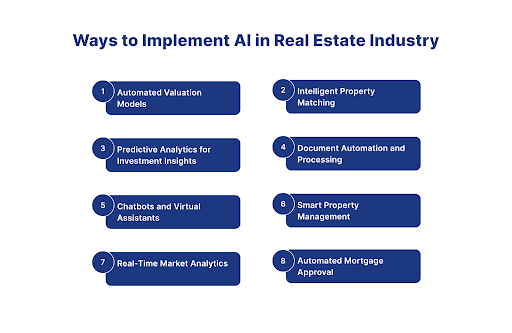8 Ways To Implement AI In Real Estate Industry
AI in real estate industry offers improved client experiences and higher efficiency as technology breakthroughs continue transforming many industries
Introduction

- Historically characterized by its dependence on complex procedures and human knowledge, the real estate sector is about to undergo a shift propelled by artificial intelligence (AI). AI in real estate industry offers improved client experiences, data-driven insights, and higher efficiency as technology breakthroughs continue transforming many industries. In this blog, we will look at a number of ways that artificial intelligence (AI) may be used in the real estate sector, changing the game for both professionals and consumers.
Ways to Implement AI in Real Estate Industry

1.Automated Valuation Models
-
Real estate property valuation procedures used to be labor-intensive and sometimes susceptible to personal opinion. To evaluate the value of a property, real estate experts used comparables and their understanding of the market.
-
Automated Valuation Models are the result of implementing AI in real estate industry; they use machine learning techniques to evaluate big datasets and produce more accurate property value determinations. AVMs provide more accurate values by considering a wide range of parameters, such as neighborhood characteristics, market trends, and property conditions. This lessens the reliance on subjective evaluations.
2.Intelligent Property Matching
- It took much time for potential renters and purchasers to manually sort through real estate listings to locate the perfect residences or business premises. The procedure frequently resulted in a search that was tiresome and overwhelmed with information.

- With the rise of AI in real estate industry, personalized suggestions are reaching new heights. AI algorithms can now analyze mountains of historical data, user preferences, and detailed property attributes to generate hyper-focused recommendations. This "intelligent property matching" goes beyond generic filters, pinpointing listings that resonate with each user's needs and desires. The result? A dramatically improved experience for both tenants and buyers. Relevant listings surface quickly, saving time and effort during the often stressful search process. The odds of finding that perfect dream home skyrocket while the overall journey becomes far more efficient and streamlined. It's a win-win powered by the magic of AI.
3.Predictive Analytics for Investment Insights
-
Real estate investors frequently have difficulty forecasting changes in property values and spotting profitable investment possibilities. Making wise investment selections was complex due to the dearth of powerful predictive analytics tools.
-
Predictive analytics technologies powered by AI rapidly transform the real estate industry, empowering investors with a potent blend of historical data, live market conditions, and economic forecasts. This sophisticated AI in real estate industry toolset goes beyond mere data analysis, offering actionable insights for smarter portfolio optimization, identifying high-growth areas, and generating accurate property value forecasts. Investors are no longer confined to gut instinct or guesswork; they now have the advantage of data-driven decision-making, thanks to the seamless integration of AI into real estate investing.
4.Document Automation and Processing
-
The real estate sector has always handled a large volume of paperwork, including contracts and legal documents. These papers were frequently processed manually, which raised the chance of mistakes and caused delays.
-
Artificial intelligence (AI) technologies allow for the efficient and automated processing of texts, such as Natural Language Processing (NLP). AI-powered solutions can guarantee compliance, collect pertinent data, and expedite paperwork. This improves accuracy and compliance while simultaneously lowering administrative costs. These capabilities have significant implications for AI in real estate industry, where AI can streamline property listings, automate property valuations, and even match buyers and sellers.
5.Chatbots and Virtual Assistants
-
In the real estate industry, in-person contacts and conventional marketing techniques are major in customer engagement. Providing clients with timely and personalized information was a problem for the business.
-
Artificial intelligence (AI)-driven chatbots and virtual assistants improve consumer interaction by giving prompt answers to questions, presenting property details, and even helping customers with the purchasing or leasing process. The round-the-clock accessibility enhances client satisfaction and promotes more effective contact between real estate agents and their clients.
6.Smart Property Management
-
Property management and upkeep required much manual supervision. Property managers have difficulties in anticipating maintenance needs, responding quickly to problems, and maximizing operational effectiveness.
-
Real-time property condition monitoring is made possible by AI-enabled property management systems, which use sensors, IoT devices, and predictive analytics. Predictive maintenance, energy optimization, and increased managerial effectiveness are all made possible by this. AI-driven solutions help with proactive problem-solving, increased tenant satisfaction, and cost savings.
7.Real-Time Market Analytics
-
Real estate companies hire employees to analyze market trends. With the help of humans, companies can not analyze real-time data on market trends. Sometimes, humans make a mistake in analyses of market trends. It was sometimes difficult for real estate experts to keep up with the quickly shifting market trends, which affected their capacity to make wise selections.
-
AI in real estate industry processes enormous amounts of information, such as social media trends, economic indicators, and real estate transaction histories, to deliver real-time market insights. This gives real estate agents a competitive edge in the market by allowing them to keep up to date on market dynamics, spot new trends, and modify their strategy appropriately.
8.Automated Mortgage Approval
-
Real estate companies need to hire employees in the traditional mortgage approval process. Then, customers need to submit their documents to the employees. Then, employees have to review the paper and decide whether to approve it. This manual process of mortgage approval is very long and time-consuming, so customers do not get approval on time.
-
AI In real estate industry expedites the mortgage approval process through automated algorithms that evaluate financial data, credit histories, and risk variables. This lowers the possibility of defaults, improves accuracy, and expedites approval. Lending choices are made with more knowledge thanks to AI-driven credit scoring algorithms.
Conclusion
- Beyond specialized applications, AI in real estate industry is completely transforming how professionals work, make choices, and interact with clients. Artificial Intelligence (AI) is a force for good in the real estate industry, reducing risks, increasing efficiency, and improving experiences for all parties involved. It is used in everything from automated mortgage approval to intelligent property management. The industry is well-positioned for a future marked by innovation, data-driven insights, and a more flexible and responsive approach to the market's changing demands as long as it continues to embrace AI.
How Digiqt will help you adapt AI in your company
-
At Digiqt, we are dedicated to assisting companies in automating critical processes. Our highly skilled and professional team ensures the timely development and delivery of AI software. We commence by thoroughly understanding our client's specific requirements, and based on these requirements, our proficient team develops the AI software. Furthermore, we provide our clients with monthly updates on the software development progress.
-
Digiqt's commitment to automation, client-centric software development, and regular updates ensures efficiency and effectiveness in streamlining insurance operations.
Contact Us
Frequently Asked Questions
What are 8 Ways To Implement AI In Real Estate Industry?
8 Ways To Implement AI In Real Estate Industry are AI-powered systems that automate and optimize processes using machine learning, natural language processing, and intelligent decision-making capabilities.
How do 8 Ways To Implement AI In Real Estate Industry work?
8 Ways To Implement AI In Real Estate Industry work by analyzing data, learning patterns, and executing tasks autonomously while integrating with existing systems to streamline operations and improve efficiency.
What are the benefits of using 8 Ways To Implement AI In Real Estate Industry?
The benefits include increased efficiency, reduced operational costs, improved accuracy, 24/7 availability, better customer experience, and data-driven insights for decision-making.


















